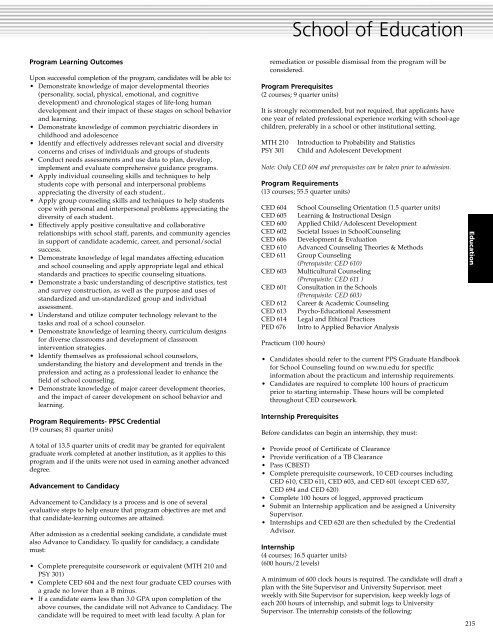Catalog 73 - National University
Catalog 73 - National University
Catalog 73 - National University
- No tags were found...
Create successful ePaper yourself
Turn your PDF publications into a flip-book with our unique Google optimized e-Paper software.
School of EducationProgram Learning OutcomesUpon successful completion of the program, candidates will be able to:• Demonstrate knowledge of major developmental theories(personality, social, physical, emotional, and cognitivedevelopment) and chronological stages of life-long humandevelopment and their impact of these stages on school behaviorand learning.• Demonstrate knowledge of common psychiatric disorders inchildhood and adolescence• Identify and effectively addresses relevant social and diversityconcerns and crises of individuals and groups of students• Conduct needs assessments and use data to plan, develop,implement and evaluate comprehensive guidance programs.• Apply individual counseling skills and techniques to helpstudents cope with personal and interpersonal problemsappreciating the diversity of each student..• Apply group counseling skills and techniques to help studentscope with personal and interpersonal problems appreciating thediversity of each student.• Effectively apply positive consultative and collaborativerelationships with school staff, parents, and community agenciesin support of candidate academic, career, and personal/socialsuccess.• Demonstrate knowledge of legal mandates affecting educationand school counseling and apply appropriate legal and ethicalstandards and practices to specific counseling situations.• Demonstrate a basic understanding of descriptive statistics, testand survey construction, as well as the purpose and uses ofstandardized and un-standardized group and individualassessment.• Understand and utilize computer technology relevant to thetasks and roal of a school counselor.• Demonstrate knowledge of learning theory, curriculum designsfor diverse classrooms and development of classroomintervention strategies.• Identify themselves as professional school counselors,understanding the history and development and trends in theprofession and acting as a professional leader to enhance thefield of school counseling.• Demonstrate knowledge of major career development theories,and the impact of career development on school behavior andlearning.Program Requirements- PPSC Credential(19 courses; 81 quarter units)A total of 13.5 quarter units of credit may be granted for equivalentgraduate work completed at another institution, as it applies to thisprogram and if the units were not used in earning another advanceddegree.Advancement to CandidacyAdvancement to Candidacy is a process and is one of severalevaluative steps to help ensure that program objectives are met andthat candidate-learning outcomes are attained.After admission as a credential seeking candidate, a candidate mustalso Advance to Candidacy. To qualify for candidacy, a candidatemust:• Complete prerequisite coursework or equivalent (MTH 210 andPSY 301)• Complete CED 604 and the next four graduate CED courses witha grade no lower than a B minus.• If a candidate earns less than 3.0 GPA upon completion of theabove courses, the candidate will not Advance to Candidacy. Thecandidate will be required to meet with lead faculty. A plan forremediation or possible dismissal from the program will beconsidered.Program Prerequisites(2 courses; 9 quarter units)It is strongly recommended, but not required, that applicants haveone year of related professional experience working with school-agechildren, preferably in a school or other institutional setting.MTH 210PSY 301Introduction to Probability and StatisticsChild and Adolescent DevelopmentNote: Only CED 604 and prerequisites can be taken prior to admission.Program Requirements(13 courses; 55.5 quarter units)CED 604CED 605CED 600CED 602CED 606CED 610CED 611CED 603CED 601CED 612CED 613CED 614PED 676Practicum (100 hours)School Counseling Orientation (1.5 quarter units)Learning & Instructional DesignApplied Child/Adolescent DevelopmentSocietal Issues in SchoolCounselingDevelopment & EvaluationAdvanced Counseling Theories & MethodsGroup Counseling(Prerequisite: CED 610)Multicultural Counseling(Prerequisite: CED 611 )Consultation in the Schools(Prerequisite: CED 603)Career & Academic CounselingPsycho-Educational AssessmentLegal and Ethical PracticesIntro to Applied Behavior Analysis• Candidates should refer to the current PPS Graduate Handbookfor School Counseling found on ww.nu.edu for specificinformation about the practicum and internship requirements.• Candidates are required to complete 100 hours of practicumprior to starting internship. These hours will be completedthroughout CED coursework.Internship PrerequisitesBefore candidates can begin an internship, they must:• Provide proof of Certificate of Clearance• Provide verification of a TB Clearance• Pass (CBEST)• Complete prerequisite coursework, 10 CED courses includingCED 610, CED 611, CED 603, and CED 601 (except CED 637,CED 694 and CED 620)• Complete 100 hours of logged, approved practicum• Submit an Internship application and be assigned a <strong>University</strong>Supervisor.• Internships and CED 620 are then scheduled by the CredentialAdvisor.Internship(4 courses; 16.5 quarter units)(600 hours/2 levels)A minimum of 600 clock hours is required. The candidate will draft aplan with the Site Supervisor and <strong>University</strong> Supervisor, meetweekly with Site Supervisor for supervision, keep weekly logs ofeach 200 hours of internship, and submit logs to <strong>University</strong>Supervisor. The internship consists of the following:215Education
















